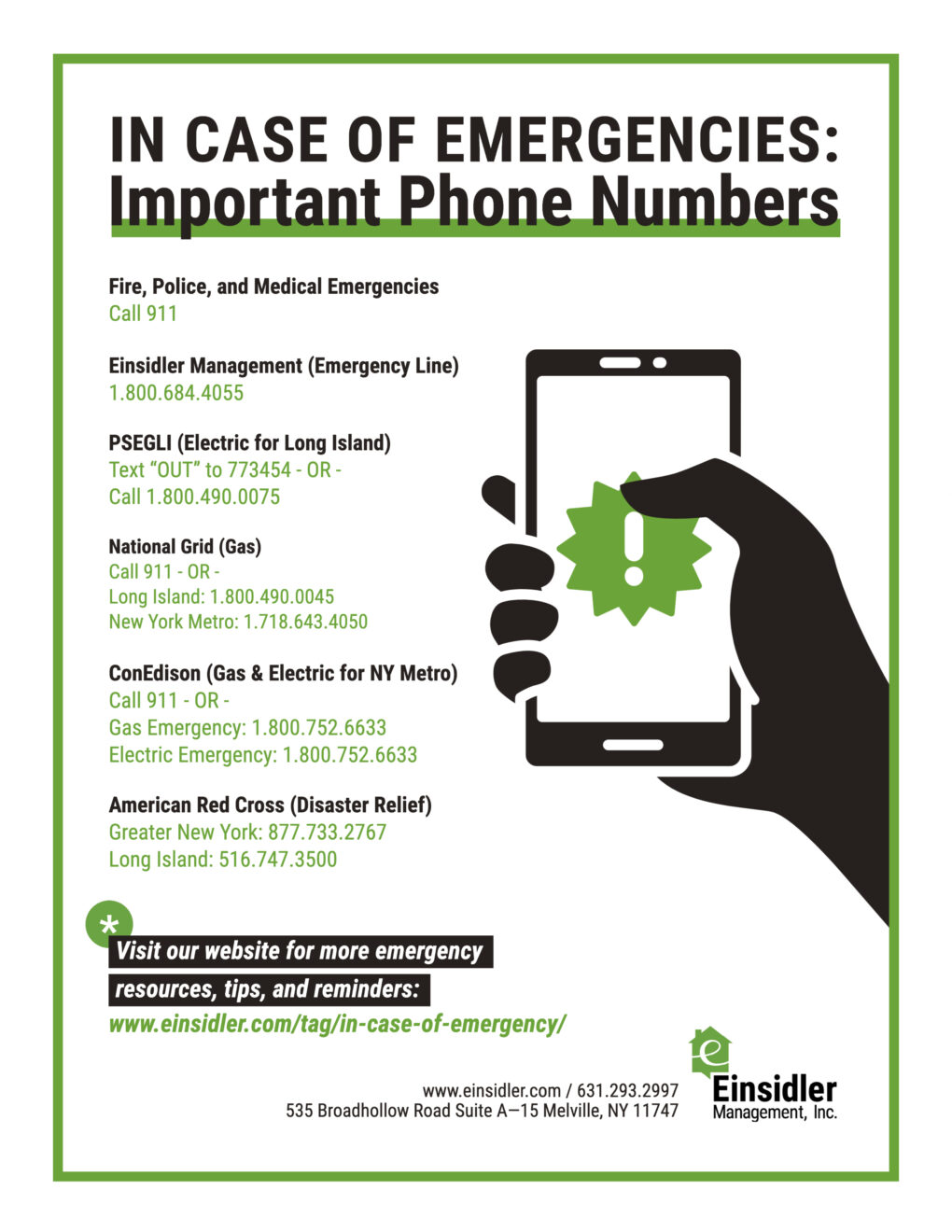A large component of fire safety is minimizing potential risks within your home and community. Help to keep your co-op, condo, or HOA clear of fire hazards by avoiding these dangerous conditions in your home and surrounding community.

Follow Us on Social Media:
How to Report a Fire
- Evacuate, then Call 911
- Contact Management
- Contact Your Superintendent (if applicable)
How to Contact Einsidler Management, Inc.
Emergency Hotline (For Building, Home, or Community Emergencies Only)*: 1800.684.4055
Office (Non-Emergencies): 631.293.2997 / 718.233.1390
Online Contact Form
*Always call 911 first in the event of a life-threatening emergency*
Unsure Who to Contact in the Event of an Emergency?
See our Guide: Who to Contact In a Home or Building Emergency
32 Fire Hazards to Avoid in Your Home and Community by Room and Common Area
The Kitchen
- Unattended Kitchens
Do not leave stoves or kitchen areas unattended while cooking or preparing food using a heat source. - Toaster Ovens
Clean toaster oven trays regularly. Crumbs can become a fire hazard when they accumulate over time. - Metal and Microwaves
Keep metal dishware, foils, and other containers out of microwaves and toasters. Additionally, check to make sure that your dishware is “microwave safe” before placing it in the microwave. Plastic can melt, therefore becoming a fire hazard. - Flammable Materials and Objects
When using the stove, keep it clear of kitchen towels, food packaging, recipe books, or anything else that can set the kitchen (or more) on fire. - Cooking Ingredients
Use extra caution when cooking with oils, cooking wines, and foods that can produce high flames or smoke. In the event of a cooking fire, be sure to have a suitable fire extinguisher nearby (one that can handle a grease fire). - Expired Fire Extinguishers
Fire extinguishers have an expiration date, so replace them as needed. Check the expiration date at least twice a year. Daylight savings is a good time to do this. - The Holiday Season
Use extra caution while cooking around the holidays, as the rush and longer timeframe to prepare for gatherings can create unwanted hazards.
The Laundry Room
- Dryer Lint
Always check for dryer lint prior to adding a load of laundry into the dryer. Additionally, if you have in-unit or in-home laundry units, make sure that your dryer vent is cleaned a few times a year, as the accumulation of lint can become a fire hazard in your home. - Clothing Irons
Do not leave clothing irons plugged in after use. Additionally, never leave them unattended while in use and always rest them on a non-flammable object or surface.
Closets
- Overheating from Light Sources
Consider using LED lightbulbs because they are energy efficient and produce less heat than other types of bulbs. Heat can come from the light source and if a closet is crowded or contains objects that are too close to the light, it can become a fire hazard. - Flammable Liquids, Solvents, etc.
Flammable materials and solvents should be stored with caution, or not be stored at all (see your governing documents regarding flammable materials and solvents).
In the Bathroom
- Extension Cords and Water
Do not use extension cords in the bathroom, to help keep all wiring and electronics away from water. - Hair Straighteners and Curling Irons
Unplug curling irons and straightening irons after each use and let them cool down on a non-flammable surface before storing them away.
Living Rooms and Bedrooms
- Low-Quality or Faulty Electronics and Appliances
Pay attention when electronics such as laptops, computers, etc. overheat and give them time to cool down. Check all appliances for a “UL” seal, which will ensure that the electronics were tested for safety purposes. - Heat Sources
Avoid placing flammable materials (i.e.- blankets, clothing, furniture) near heat sources such as vents, radiators, fireplaces, candles, space heaters (prohibited in some communities), etc.. If objects are too close, they can overheat, thus creating smoke and/or flames. - Frayed or Old Wires
Discard of electronics with faulty or frayed wires. Consider having antique appliances rewired if you do not wish to replace them with more modern alternatives. While they can be valuable, nostalgic, or sentimental, they can be hazardous due to their creation using outdated fire codes. - Loose Outlet Plates
Alert management of any loose outlet plates where prongs are not snugly fitting (or hire an electrician, depending on ownership responsibilities. You can check your governing documents to get a clear idea of what is management’s responsibility vs. the homeowner’s or shareholder’s responsibility). - Overloaded Extension Cords
Do not overload extension cords with high-voltage items. Some items should only be plugged directly into an outlet. - Lightbulbs with Improper Voltage
Check lightbulbs and lamps for proper voltage to ensure that appliances do not overheat and become a fire hazard in your home. - Clutter
Keep your home clear of excess clutter. In extreme cases, it can contribute to fire hazards and make it difficult to evacuate (or have first responders enter) in the event of a fire. - Open Flames
Keep all pets away from open flames from candles, fireplaces, and stovetops. One swat with a tail or paw can set a table or worse on fire! Swap out flame-lit candles for battery-lit candles. While everyone enjoys the scented aroma of candles, they can be dangerous if left unattended or near an object that can catch fire.
Common Areas, Outdoor Spaces, and Amenities
- Keeping Certain Doors Open
Certain doors in common areas need to remain closed in the event of a fire. This helps in slowing the spread of fire in the event of one. These doors include hallway doors, doors to stairwells, etc. In the event of a fire, close all doors behind you to also prevent spread into other areas of the community or building. - Fireworks
Fireworks are illegal in New York State and are a fire hazard. Do not use them in your home or community for July 4th or any other occasion. - Elaborate Birth or Gender Reveal Announcements
Keep gender reveal parties and stunts fire and explosive-free! There have been many notable incidents (i.e.-the 2021 California Wildfire “El Dorado”!) where a gender reveal has gone wrong and led to fires or other emergencies. - Smoking
Smoking is prohibited in many communities. However, in some cases, there may be a designated outdoor smoking area. Make sure to put out any cigarettes in their entirety so that they cannot catch any nearby shrubs or objects on fire. - Grills
Charcoal and propane grills may be prohibited in your community. In some cases, grills may only be used in designated areas away from buildings and other structures. For example, charcoal grills may not be permitted on decks or patios since flames can potentially become a fire hazard. Check your communities’ policies and our Grilling Alternatives article for more details. - Propane Tanks
Propane tanks should not be stored indoors, as vapors can become hazardous. Additionally, make sure that the valve is always closed to prevent leaks, and do not store tanks in direct sunlight. Keep tanks away from objects that could potentially catch on fire in the event of a leak.
Garages, Parking Lots, and Storage Areas
- Smoking Near Gas Tanks
Do not smoke in parking garages or storage areas. - Blocking Exits with Belongings
Keep storage areas (and other shared spaces within your co-op, condo, or HOA) clear of any objects that are blocking entrances or exits in the event of an emergency. - Improper Storage of Materials
Do not store flammable materials in the garage or in storage areas.
Fire Escapes and Stairwells
- Blocking Stairwells or Exits
Do not block windows, fire escapes, and stairwells from use in the event of an emergency. Additionally, report any damage or needed repairs to management in a timely matter. - Lack of Awareness of Nearest Exit(s)
Take note of the closest exits from your unit and note all alternative routes in the event of a fire emergency.
Additional Fire & Safety Resources

For Your Fridge:
In Case of Emergencies: Important Phone Numbers
Conclusion
Fire safety is critical when you are a homeowner, shareholder, or resident. Luckily, many fire hazards can be easily avoided by staying vigilant or making small adjustments within your home. Avoiding hazardous conditions and fire risks can help prevent a fire in your home, unit, or community.

